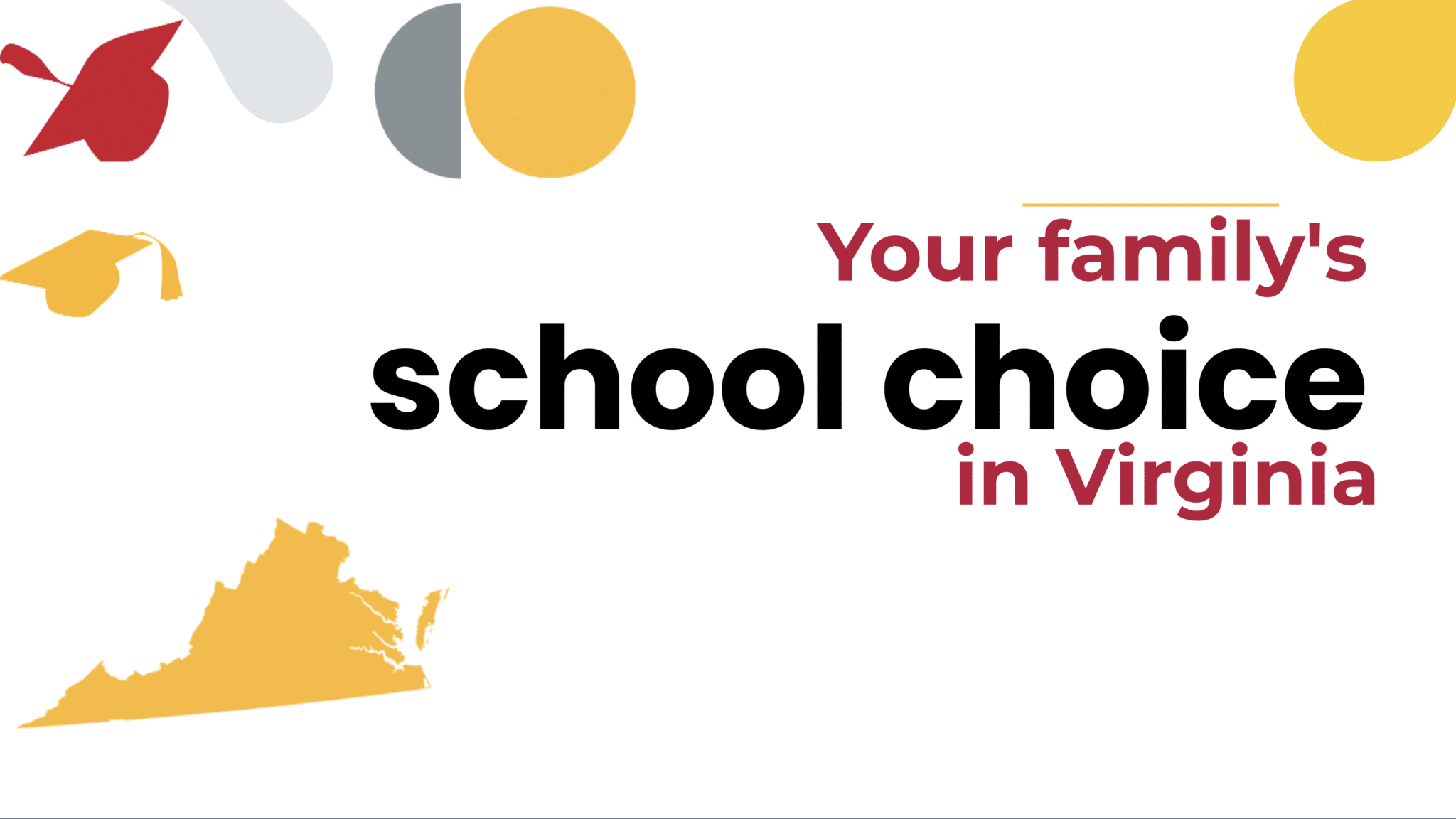Choosing a school? You’ve got options.
If you’re wondering about school choice in Virginia, here are two things to remember. First off, you’re not alone. Every year, tens of thousands of parents in Virginia make K-12 school decisions for their children. Secondly, you can do it! Understanding your state’s different school options can help you find a learning environment where your child is not just “getting by” at school, but actually thriving and inspired to learn.
This post will break down the school choice options available for the nearly 2 million children living in the Old Dominion State. In short, families can choose from traditional public schools, public charter schools, public magnet schools, private schools, online learning, homeschooling, and microschooling and mix-and-match learning.
Looking for special education options? You can learn what special education services are available in Virginia at the Ultimate Guide to Special Education.

- Traditional Public Schools
- Public Charter Schools
- Lab Schools
- Public Magnet Schools
- Private Schools
- Online Schools
- Homeschool
- Microschooling
Virginia Traditional Public Schools
Most Virginia families choose traditional public schools. These are operated by school districts, free to attend, open to all students, and funded by taxpayers. In Virginia, 73.1% of all K-12 students attend a traditional public school. Did you know that, on average, Virginia spends $13,835 per public school student each year? You can search your school’s spending and that of nearby schools at Project Nickel.
In Virginia, the state allows each district to set its own open enrollment policies. “Open enrollment” refers to whether parents can send their children to any public school, regardless of where it is located. Parents wanting to transfer their child to a different public school should contact their local school district to see if this is possible. For example, Albemarle County Public Schools generally requires students to attend their zoned school, but does allow transfers in some cases, such as for medical or emotional health, or because of a family move. In Virginia, while a transfer within your district may be possible, transfers between districts are generally not available and may cost.
Open enrollment is a valuable public school choice, increasing parents’ options and ensuring that zip code isn’t the sole determiner of their education. Find out more about public schools in your state at the Virginia Department of Education. You can also learn more about open enrollment at “Public Schools Without Boundaries: A 50-State Ranking” and “Virginia Public School Divisions’ Tuition Rates Charged to Transfer Students.“
Virginia Charter Schools
Also, depending on where you live in Virginia, public charter schools may be another free option for you to consider. Like traditional public schools, charter schools are public, free, and usually have no requirements for entry. What distinguishes charter schools is that they have extra freedom to innovate with learning methods. Charters are accountable to authorizing entities for results.
Virginia passed charter school legislation in 1998. Today, Virginia has seven public charter schools. Each school has a charter which explains the school’s purpose and what specific community need it serves, whether that be providing a Spanish immersion program or offering a rigorous STEAM curriculum. If there are more families seeking admittance to a charter school than there are seats, a lottery system is usually used to determine admittance.
Virginia Lab Schools
In 2023, the Governor’s Office announced plans to develop more than a dozen public “lab schools.” While not charter schools, these lab schools share some common features. Lab schools are educational institutions that offer unique and innovative learning opportunities to students ranging from preschool to grade 12.
Lab school programs can be specifically tailored to the needs of a particular community or student population. Some even being customized to meet the individual requirements of students with special educational needs, gifted students, or other specific student populations.
Enrollment in lab schools is open to Virginia residents, but admission is based on a lottery system and depends on availability. Therefore, interested families should apply well in advance of the academic year if they wish to enroll. Lab school applications must be submitted before February 2, 2024.
Virginia’s first lab school is CodeRVA Regional High School, which prepares students for computer science careers.
Learn more at the Virginia Department of Education.
Virginia Magnet Schools
Additionally, Virginia families have a third public school option in magnet schools. Magnet schools are free public schools that allow kids to narrow in on a specific learning track, such as an International Baccalaureate program or the performing arts. Magnet schools teach all subjects through the lenses of that specific track. These schools can be good options for children who learn best through their favorite subject. In Virginia, 14.1% of all K-12 students attend a public magnet school.
Virginia has several magnet school options, including the well-ranked Thomas Jefferson High School for Science and Technology. School districts with magnet schools include Fairfax County Public Schools, Newport News Public Schools, York County School Division, Hampton City Schools, and more. Virginia magnet choices range from marine science to global studies and creative arts.
Virginia Private Schools
Families in Virginia can even consider private schools, nonpublic schools that charge tuition. Private schools may offer a unique curriculum, smaller class sizes, or a faith-based tradition. Virginia’s more than 1,000 private schools come in all shapes and forms, from religious schools to schools designed for children with special needs.
The average tuition for private schools in the state is $13,434 for elementary schools and $17,265 for high schools. In Virginia, a state-run scholarship program is available to students with family incomes below 300% of the federal poverty level ($83,250 for a family of four in 2022-2023) and students with special needs. Also, the federal government does allow parents to save for K-12 private school tuition using tax-preferred 529 savings accounts. Currently, 0.4% of all K-12 students participate in a private school choice program in Virginia.
Learn more at the Virginia Council for Private Education and Private School Review: Virginia.
Virginia Online Learning
Also, don’t overlook online learning! It offers a uniquely flexible learning environment that meets a variety of family needs. Whether your child wants to accelerate his or her learning or needs a quieter environment in which to focus, you may be interested in giving virtual school a try.
Virginia students can enroll in free, full-time online learning through Virginia Virtual Academy. Additionally, K-12 students may be able to take part-time or full-time online classes through their local school in partnership with the state’s virtual school, Virtual Virginia. Tuition is usually covered by the public or private school in which the student is enrolled, or the parents if the student is homeschooled.
In some areas, districts have also developed their own part-time or full-time online school programs. These include Prince William County Public Schools’ Virtual High School, Fairfax County Public Schools’ Online Campus, Loudoun County Public Schools’ supplemental online courses, York County School Division’s Virtual Academy, Chesapeake Virtual Academy, and Virginia Beach City Public Schools’ Digital Campus.
Virginia students are actually required to take at least one online course or blended learning experience to graduate. To read more about online learning in Virginia, check out the Digital Learning Collaborative’s state profile.
Virginia Homeschooling
In all 50 states, families can also choose to homeschool, which allows for high levels of customized learning and flexibility. Homeschooling is the process of parents educating students at home. About 57,000 (4.1%)Virginia students are currently homeschooling!
In Virginia, it is required that you provide notice of your intent to homeschool by August 15 or immediately upon choosing homeschool. A unanimous Virginia Supreme Court decision in 2020 emphasized that this step is a simple notification rather than a request to the school board. This court decision also ruled that school boards cannot establish their own demands for homeschooling families.
The state does not require homeschooling parents to teach specific subjects but may require some amount of standardized testing depending on the homeschool option chosen. In general, children who are homeschooled may face roadblocks if they want to participate in public school sports in Virginia. However, you can always look for other sports leagues or co-ops near you.
If you choose homeschooling, it is recommended that you formally withdraw from your public school so your student is not marked truant. If you decide to return to public school, your school will review your homeschool records and may administer tests for placement.
To learn more, you may wish to check out the Home Educator’s Association of Virginia and Home School Legal Defense Association – Virginia.
Virginia Microschools and Mix-and-Match Learning
Today, many Virginia families are mixing and matching school options to come up with new ways to personalize education. Microschools are one of these ways. A microschool refers to students gathering together in a small group – with adult supervision – to learn, explore, and socialize. Microschools can take a variety of shapes and legal forms, from homeschoolers coming together at an enrichment center to a private school committed to small classrooms. What microschools share in common is a distinct commitment to small-group learning, close-knit relationships, and an emphasis on children as individual learners.
Here are a few real examples of microschools and related resources in your state:
- The Grand Magnolia School, a microschool in Richmond, has a cohort-based learning model and 4:1 student-to-teacher ratio, allowing children to receive an extremely customized, intentional education.
- Cultural Roots Homeschool Cooperative is a learning community with programming around the diverse cultural attributes, traditions, and histories of Black, Brown, and Indigenous communities.
- Path of Life Learning offers a nurturing, faith-based learning pod environment for homeschoolers online school students.
- Solstice Hybrid Academy provides homeschool-style learning with personalized guidance and creative opportunities in Norfolk.
- Aquinas Learning, based out of Manassas, offers a classical homeschool curriculum that some families use together at Aquinas Learning centers, either in-person or virtual.
- Richmond Primary School is a private microschool located in Richmond that offers education for students from kindergarten to fifth grade.
- RISE Hybrid Academy evolved from a small community homeschool program to a nationally accredited, K-12th grade private school. The school offers on-site learning options as well as homeschool curriculum.
- Dream Tech Academy in Hopewell was founded to give children a more personalized learning opportunity through small-group classes. The small school also offers tutoring and summer camp opportunities.
- Path of Life Learning is a modern, God-centered small-group learning center. K-2 students use a classical homeschool curriculum while families of older students can choose the online or homeschooling curriculum that works best for them.
- Schole Center for Innovative Education is a hybrid school located in Arlington that prioritizes hands-on experiences and exploration in learning.
Remember, microschooling is more a mentality than a specific legal distinction in most cases. Often, a family participates in a microschool while legally homeschooling, or being enrolled in a private or online school.
Search for Schools Near Me
Microschooling and Mix-and-Match Learning
How can it empower parents and help kids achieve their dreams?
7 Step Guide
Tips to help you find a school where your daughter or son will learn, succeed, and be happy.
Education Resources for
Virginia Parents
For additional information about school choices in
Virginia, visit these resources:
Every state is different when it comes to school choice options.
Sign up below to get a detailed comparison:
"*" indicates required fields
